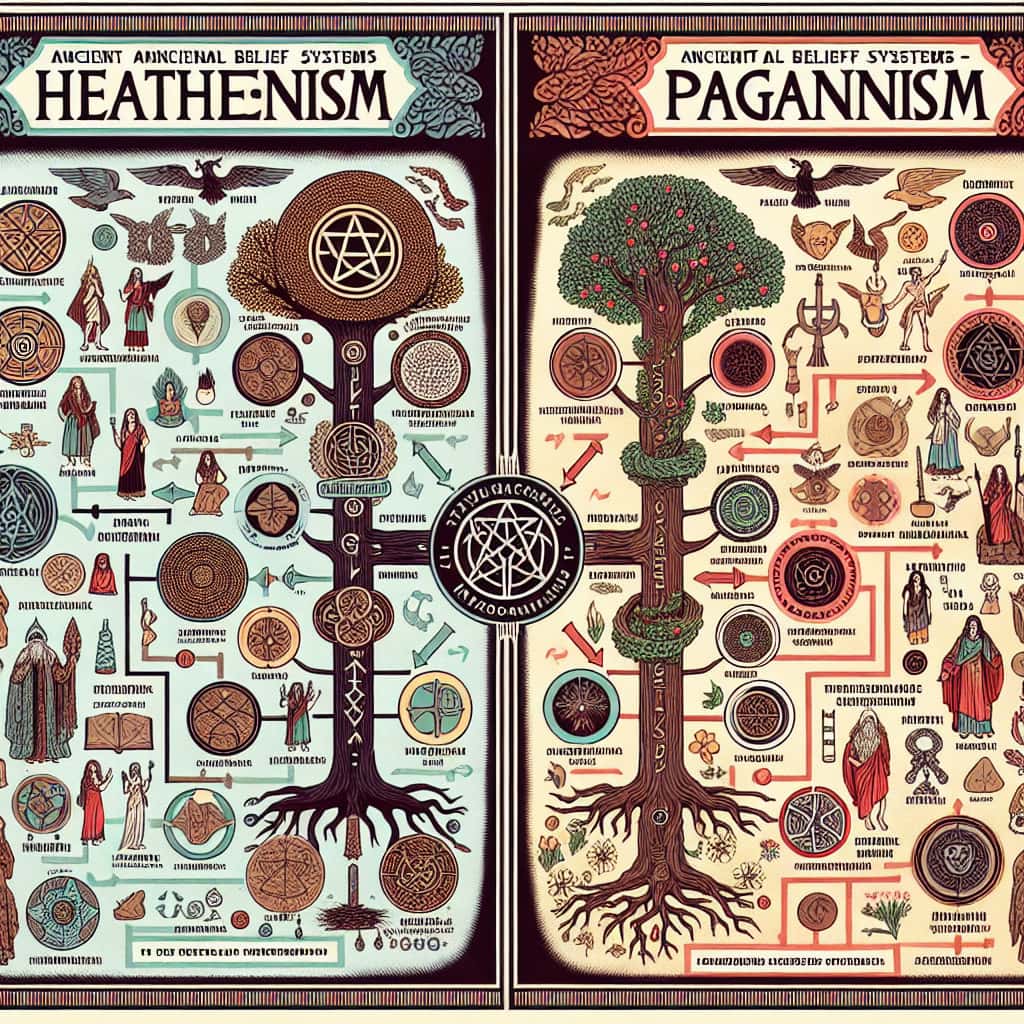Heathenry and Paganism are two ancient spiritual practices that have experienced a resurgence in popularity in recent years. While the two terms are often used interchangeably, there are distinct differences between them. This article will explore the similarities and differences between Heathenry and Paganism, and discuss how they are practiced today.

Heathenry and Paganism are two different spiritual paths, though they are often confused with one another. Though both paths are rooted in ancient European traditions and beliefs, they have some important differences that set them apart. This article will explore the differences between Heathenry and Paganism, as well as looking at some of the similarities between the two.
What is Heathenry?
Heathenry is a form of contemporary Germanic Paganism, based on the pre-Christian belief systems of the ancient Germanic peoples. It is a reconstructionist religion, meaning that it seeks to bring back the beliefs, practices, and values of the ancient Germanic peoples as accurately as possible. Heathens honor the gods and goddesses of the Germanic pantheon, such as Odin, Thor, and Freya, as well as honoring their ancestors. Heathens also have a strong emphasis on living a life that is in harmony with nature.
What is Paganism?
Paganism is an umbrella term that refers to a wide variety of earth-centered spiritual paths and belief systems. It encompasses a wide range of spiritual traditions and beliefs, including Wicca, Druidry, Asatru, and Shamanism, among others. Paganism does not have a single set of beliefs or practices, and there are many different paths within it. However, most Pagans share an emphasis on living in harmony with nature, honoring the gods and goddesses of their particular path, and celebrating the cycles of the seasons.
Differences between Heathenry and Paganism
The main difference between Heathenry and Paganism is the focus of their beliefs. Heathenry is focused on the ancient Germanic belief systems, while Paganism encompasses a wide variety of spiritual paths and traditions. Heathens follow a more specific set of beliefs and practices, while Pagans have more freedom to choose which beliefs and practices they follow.
Heathens also have a strong emphasis on ancestry and honoring their ancestors. Heathens believe that they are connected to their ancestors by an unbroken line of blood, and they honor their ancestors as part of their spiritual practice. Pagans, on the other hand, may or may not have an emphasis on honoring their ancestors, depending on their particular path.
Heathenry also has a strong focus on the gods and goddesses of the Germanic pantheon, while Paganism has a more varied pantheon, depending on the particular path. Heathens honor Odin, Thor, and Freya as the primary gods, while Pagans may honor a different pantheon of gods and goddesses, depending on their path.
Similarities between Heathenry and Paganism
Though Heathenry and Paganism are two distinct spiritual paths, they do share some similarities. Both Heathens and Pagans share an emphasis on living in harmony with nature and honoring the cycles of the seasons. They both seek to create a life that is in balance with the natural world, and both honor the gods and goddesses of their particular paths.
Heathens and Pagans also share a sense of community and connection with other people. Both paths have a strong emphasis on building relationships with other people and creating a sense of community. Both paths also have organizations and gatherings that allow people to connect with one another and build relationships.
Conclusion
Heathenry and Paganism are two distinct spiritual paths, though they do share some similarities. Heathenry is focused on the ancient Germanic belief systems, while Paganism encompasses a wide variety of spiritual paths and traditions. Heathens have a strong emphasis on ancestry and honoring their ancestors, while Pagans may or may not have an emphasis on honoring their ancestors, depending on their particular path. Both Heathens and Pagans share an emphasis on living in harmony with nature and honoring the gods and goddesses of their particular paths.
In conclusion, the differences between Heathen and Pagan religions are vast and varied. Heathenry is an ancient polytheistic religion that is focused on the veneration of Norse gods and goddesses. Paganism, on the other hand, is an umbrella term that encompasses a variety of different polytheistic and animistic spiritual paths. While both religions share some commonalities, it is important to note that they are distinct in their beliefs and practices. Ultimately, it is up to the individual to decide which path best suits their spiritual needs and beliefs.





